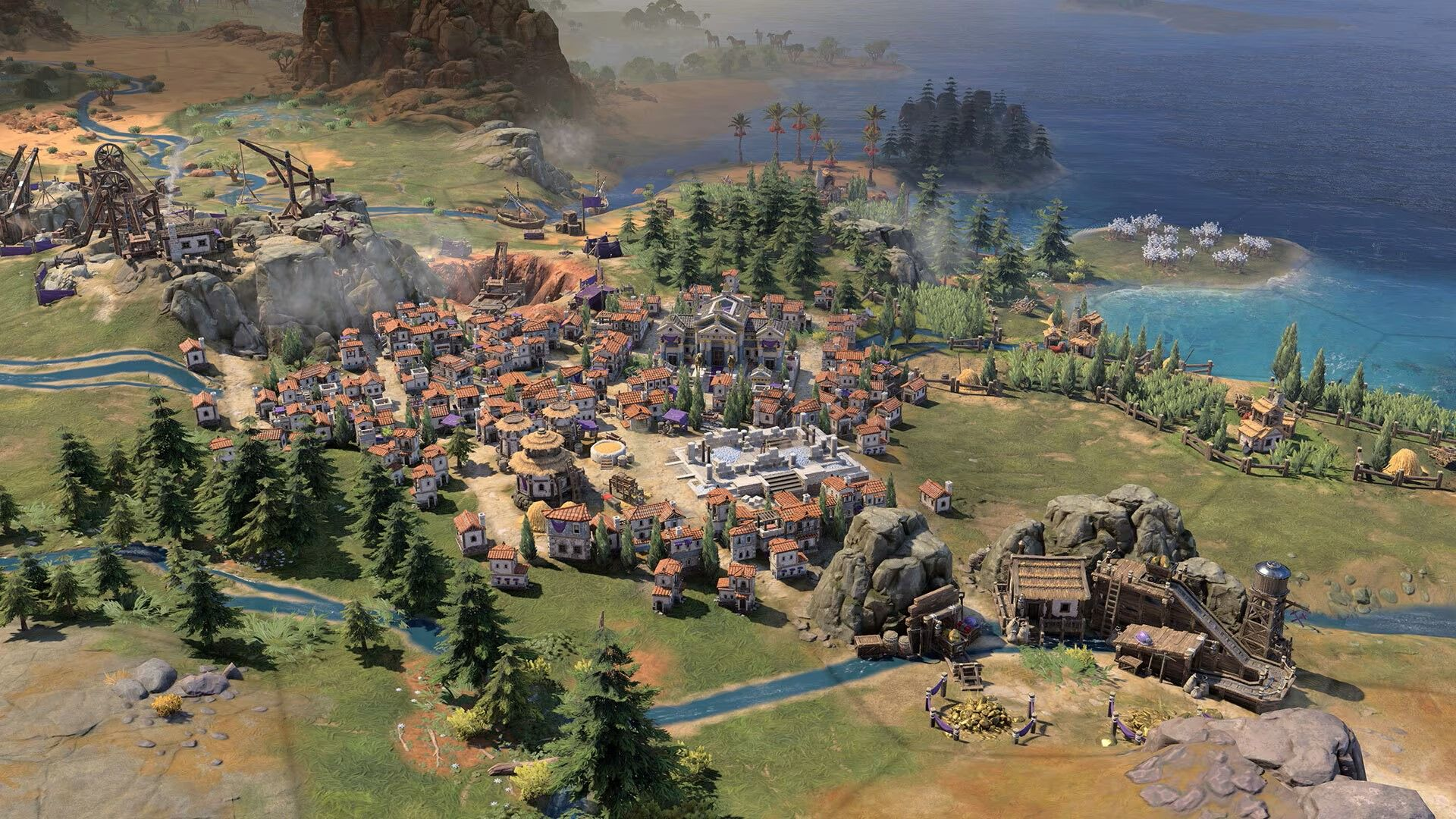First game: Lafayette, leading Rome/Spain/France. This was mostly experimental, trying (badly) to figure out the game's mechanics. I had a hard time understanding towns, cities, and district buildings, but I made it in the end. I like Rome a whole lot, Spain I fumbled with badly, and France is France. Their unique infantry is very strong at least, and combined with leftover generals from the Roman era, I was able to quickly pivot to a more military-oriented game. I saw the clock running down and tried to go for culture, which felt like some kind of Indiana Jones-type race across the globe to plunder random tiles, and ultimately won by score before I could get the World's Fair wonder completed. Lafayette's abilities are remarkably strong: free combat strength on all units, and enough happiness that I never once worried about revolts even in conquered cities.
Second game: Augustus, leading Rome/Abbasids/Meiji Japan. I wanted to go for a specialist-oriented Big City game, but as of yet I don't see a clear successor in the Modern age, so Meiji with their one civic for production on specialists won my choice. I also went ham on science, since that felt natural with specialists and the Abbasids especially. As it turns out, if you have a high enough culture output—which is incredibly easy as Augustus—you can win the cultural legacy path in Exploration just by researching lots of civics and techs, the ones that give you free relics. I didn't get a single relic from my religion's ability, since foolishly I chose the one that gives +2 relics on converting a foreign capital: foolish, since foreign capitals are almost always where their own religion is founded, and holy cities can never be converted. Oopsie. In Modern, I ended up winning through science with only 60% of the age clock passed, which also felt climactic because seemingly everyone wanted to fight me to the death.
My overall thoughts: it's incredibly fun, and it has much more longevity to me, game-wise, than VI. It captures a lot of the fun systems-oriented gameplay I enjoyed from V, and the civ swapping keeps things fresh. I was never one to try a playthrough with every single civ in earlier games because so often what made them different was only apparent for a single era; things like playing Sumeria and then having nothing really special after Antiquity, or having to wait until the end of the game for your uniques as America, really felt like a drag. Two of my favourite civs were Inca and Australia, because they consistently felt different and interesting in an evergreen way.
I do wish though that more of the architectural flavour of your past age civilisations was retained—something like having towns or ageless warehouse buildings keep the style of the past age, or the one in which they were built, rather than swapping to the current civ's building aesthetic. History is built in layers, after all...?
A nice change I haven't seen discussed much is how unique units get upgraded throughout their respective age. One thing that was always frustrating in VI was enjoying your unique unit for a little while and then discarding it like a sad toy. This was especially bad for civs like the Aztecs with their unique warrior, since it goes obsolete quick and then you lose its interesting bonuses; I think this is why the one mod that made unique unit abilities persistent was so popular.
The cultural victories feel very weak to me. 7 Wonders is neat and all, but Religion is absolutely flavourless and artifact excavation is simultaneously relentless and incomplete. It feels very strange to have the World's Fair as a moment of victory: there were a lot of those! They also didn't really exhibit international cultural artifacts so much as the industrial/agricultural advancement of the country alongside its own cultural and artistic endeavours. I can't believe I find myself missing the tourism mechanic...
Independent powers are neat as well, but they feel somehow apart from the rest of the game. Diplomacy is far and away better than VI but also feels emptier, as I miss clicking on my assortment of historical weirdos and begging for their iron in exchange for my lunch money. There's technically more ways to interact with AI leaders, but it gives the impression somehow of being less. Peace deals are also decidedly one-note, and the AI is absurdly willing to gift me random cities in peace deals when I never even touched them. I don't know why this was changed from VI, where you had to negotiate for the settlements you conquered rather than getting them unilaterally. I do like how, with the cities and towns mechanic, losing a town in a war isn't the worst thing. Wars in VII in general seem to be far less absolute than in previous games, where one side would wipe the other off the map completely, or it would end as a total stalemate. Too bad the AI seems to choose settlement locations with a football field-sized dartboard.
Overall, while it reminds me starkly of how hollow V felt on release day, I get a real impression that it will be something great with updates throughout its life.


 ) on Linux and for the moment no crash even if a load a game after last updates.
) on Linux and for the moment no crash even if a load a game after last updates.